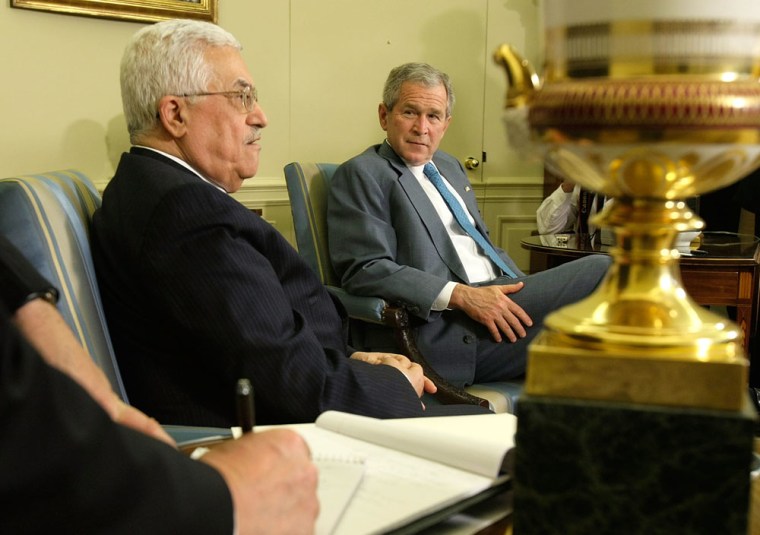Palestinian President Mahmoud Abbas said Friday he failed to achieve any progress in Middle East peace talks with President Bush and he was returning home with little to show for his visit.
In an interview with The Associated Press, the Palestinian leader sounded pessimistic about the prospects of achieving any deal with Israel this year despite a big U.S. push that began five months ago at a summit in Annapolis, Md.
"Frankly, so far nothing has been achieved. But we are still conducting direct work to have a solution," Abbas said.
Abbas said the biggest obstacle is Israel's continued expansion of Jewish settlements on Palestinian-occupied territories.
"We demanded the Americans implement the first phase of the roadmap that talks about the cessation of settlement expansion," Abbas said, expressing disappointment the U.S. hasn't exerted more pressure on Israel to stop. "This is the biggest blight that stands as a big rock in the path of negotiations."
Building on the West Bank
Israel is pushing forward with controversial building projects on disputed land in the West Bank and east Jerusalem and is refusing to take down illegal settlement outposts, release Palestinian prisoners, halt military incursions, and dismantle roadblocks that severely disrupt daily life.
Abbas' aides said he also was upset after his lunch Thursday with Secretary of State Condoleezza Rice. While discussing what a peace deal would look like, Rice didn't mention the Palestinian goal of creating a state based on borders before Israel captured Palestinian land during the 1967 Mideast war.
"We demanded that they talk about the '67 borders," Abbas told AP, showing a rare flash of anger. "None of them talks about the '67 borders."
Asked whether U.S. officials offered any new U.S. proposals, Abbas said no.
"They are exerting efforts. And we are still negotiating," he said, but he noted that no progress had been made on any of the core issues.
"All the files are still open. None of them are concluded. The situation is still as it was," Abbas said, speaking in Arabic.
The main unresolved issues include the final borders of a Palestinian state, the fate of Jerusalem, disputed Israeli settlements and Palestinian refugees.
Saeb Erekat, the chief Palestinian negotiator, said Bush didn't respond directly when Abbas brought up the issue of Palestinian objections to continuing Israeli settlement expansion when the two leaders met Thursday at the White House.
"Bush told him (Abbas) that I'm focusing on the bigger picture," Erekat explained.
Abbas said he was looking for a full Middle East peace framework agreement that would be detailed and includes timetables, while the Israelis have signaled that a "declaration of principles" would be enough of an achievement before Bush leaves office in January 2009.
"We don't want a declaration of principle because we had one," Abbas said, referring to the 1993 peace agreement reached at Oslo between the Palestinians and Israel. "Now we want a normal agreement. And then we can go for the details."
Bush to visit Israel in May
Despite his disappointment, Abbas said he would still meet with Israeli Prime Minister Ehud Olmert regularly in hopes of achieving a deal. But there are no three-way talks scheduled anytime soon with Bush, Abbas and Olmert.
Bush is scheduled to visit Israel in May to help Olmert celebrate the country's 60th anniversary, and then the U.S. president will travel to the Red Sea resort of Sharm el-Sheikh to see Abbas separately.
"It will be a bilateral meeting between me and Bush. That is the meeting I was invited for," Abbas said.
Abbas said the one thing he did achieve during his U.S visit was to lay out the Palestinian conditions for any peace deal and press his case that he cannot go for any partial agreement because the Palestinian people would not accept it.
"We have made clear our position to the president, to the State Department and to the Congress," Abbas said during the 15-minute interview in his hotel room in Washington. "And now our position is very clear to all of them."
Abbas' moderate and Western-backed government rules the West Bank, the territory that would eventually form the bulk of an independent Palestinian state. Hamas, the Islamic militant group that seized control of Gaza and serves a rival force to Abbas, is not involved in the peace negotiations with Israel.
Abbas has been losing popular support for the peace process due to a lack of any changes on the ground for people whose daily lives have been disrupted by Israeli checkpoints and roadblocks that Israel says are meant to maintain security and stop militant attacks on Israeli citizens.
